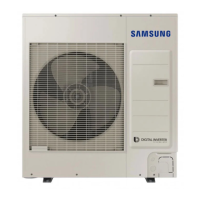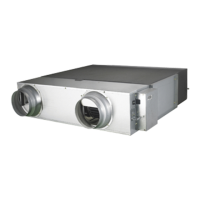Do you have a question about the Samsung AE RXYDEG Series and is the answer not in the manual?
Lists the different heat pump units and their model names.
Lists the included accessories with the product.
Diagram showing a system configuration with mono outdoor unit and control kit.
Diagram showing a system configuration with mono outdoor unit and tank integrated hydro unit.
Overall dimensions for different chassis types.
Detailed dimensions for the 1-fan chassis model.
Detailed dimensions for the 2-fan chassis model.
Shows dimensions related to water pipe connections for different models.
Details components for the AE080RXYD** model with numbered parts.
Details components for AE120/160RXYD** models with numbered parts.
General guidance and methods for moving the outdoor unit.
Specific instructions for moving the unit using wire ropes.
Specific instructions for moving the unit with a forklift.
Criteria for selecting the optimal installation location for the outdoor unit.
Specific guidelines for installing the unit in a seaside environment.
Lists specific locations or conditions to avoid for unit installation.
Details checks required before and during installation, and safety precautions.
Requirement for fire extinguishing equipment during hot work.
Guidelines for managing ignition sources in the work area.
Importance of proper ventilation during installation work.
Procedures for detecting refrigerant leaks using appropriate methods.
Requirements for labelling parts related to refrigerant handling.
Procedures for recovering refrigerant during servicing or decommissioning.
Specific requirements for installing the outdoor unit regarding space and ventilation.
Diagrams illustrating required clearances when installing one outdoor unit.
Diagrams showing required clearances for multiple outdoor units.
General guidelines for installing the outdoor unit on a base or support.
Specific instructions for wall mounting the outdoor unit using a rack.
Precautions when installing an air guide duct to avoid damaging copper pipes.
Guidance for installing in heavy snow areas, focusing on drainage and protection.
Explains how to manage condensate drainage, especially in heating mode.
Steps for preparing the foundation and ensuring proper drainage for the unit.
Advice for operating the unit in low ambient temperatures and selecting installation sites.
Guidelines for making water connections, emphasizing cleanliness and proper sealing.
Steps for flushing the system and removing air after installation.
List of critical checks before installing or commissioning the unit.
Information on using propylene glycol for freeze protection and its toxicity.
Guidelines for setting the expansion vessel pre-pressure based on water volume and height.
Formula for calculating expansion vessel pre-pressure based on installation height.
Graphs showing pressure drop characteristics with varying glycol concentrations.
Instructions for installing the flow sensor as part of the control kit.
Step-by-step procedure for filling the system with water.
Information about the absence of a pressure relief valve and its function.
Importance and location of the filter/strainer in the water system.
Requirements for insulating water pipes to prevent condensation and freezing.
Details on connecting the two electronic cables to the outdoor unit.
Wiring diagrams for 1-phase and 3-phase EHS systems.
Specifications for communication cables between indoor and outdoor units.
Terminal block specifications for AC power and communication in 1-phase systems.
Terminal block specifications for AC power and communication in 3-phase systems.
Wiring diagrams for connecting power cables using ELB for 1-phase and 3-phase systems.
Wiring diagrams for the connection cord between the control kit and outdoor unit.
Instructions for connecting cables to the terminal board using compressed ring terminals.
Table of nominal dimensions for cables, screws, and related tolerances.
Specifies tightening torque values for communication and power cables.
Step-by-step guide for connecting extended power cables.
Specifications for power cables for 1-phase outdoor and indoor units.
Specifications for power cables for 3-phase outdoor units.
Steps to check power supply and cable connections before testing.
Instructions for operating test modes using PCB buttons (K1, K2, K3, K4).
Details of information displayed in View mode (K4 switch).
Explains various option settings available via the control keys.
Lists error codes related to communication between control kit and outdoor unit.
Lists various error codes originating from the outdoor unit components.
Continues listing error codes related to outdoor unit sensors and operation.
Lists errors for control kit, wired remote, and water sensors.
Annual maintenance tasks including water pressure, filter, and relief valve checks.
Guidance on checking and maintaining glycol concentration and pH-value.
Procedures for adding refrigerant to the heat pump unit.
Instructions for installing the tundish for drain connection and pipework.
Regulatory information and warnings about using R-32 refrigerant.
Specific safety precautions when adding R-32 refrigerant.
How to measure refrigerant quantity and comply with regulations.
Instructions for filling out and adhering the refrigerant charge label.
Identifies faults, causes, and remedies for water flow problems.
Addresses issues with intermittent or continuous water discharge and their solutions.
Explains how to fix problems with the room thermostat not switching on.
Flowchart for diagnosing and resolving issues with cold hot water supply.
Flowchart for diagnosing and resolving issues with excessive hot water supply.
Step-by-step procedure for filling the water system and expelling air.
Instructions for draining and flushing the water system.
Guidance for recommissioning after specific issues like water discharge from tundish.











